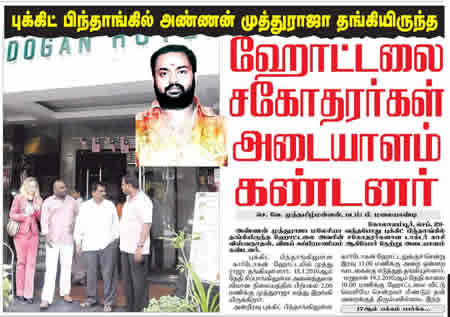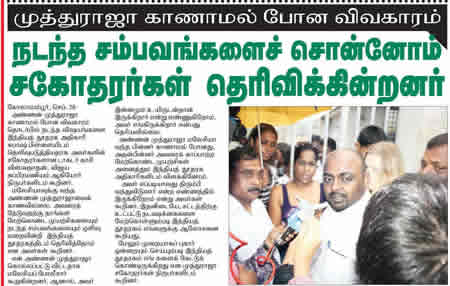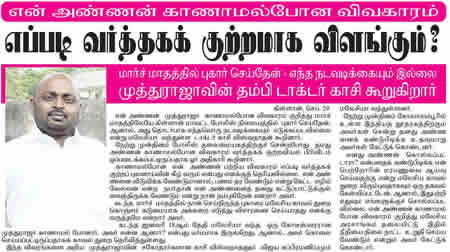'Can someone enlighten me as to who is actually disrupting racial harmony here? If candlelight vigils are seditious, then what do you call this?'
Perkasa declares 'war' against Namewee
BTN: It's time the Malays bangkit (rise) and declare 'war' against Perkasa as they are really damaging the name of the Malay race. The bigots in Perkasa acted just like hooligans and the biggest joke was calling Namewee a coward for not coming out to meet 50 over morons from Perkasa who claimed to be Malay warriors.
I'm no fan of Namewee but I believe in this situation he acted wiser than these 'Malay warriors'. Mind you, when you have those bigots from Perkasa isolated and not in group, then you will see the real face of a coward.
Dood: Under normal circumstances, the police would have acted against Perkasa for trying to intimidate, threaten and harass someone (who, I might add, has not been found guilty of anything).
If anyone else had done this, or if some people had done the same thing to any Perkasa or Umno/BN member, those people would have been hauled up by the cops already. But of course, practising double standards appear to be the norm for our police. This is the Malaysian way.
Logic: Can someone enlighten me as to who is actually disrupting racial harmony here? Or did Perkasa's youth chief Arman Azha Abu Hanifah mean Perkasa's harmony? They're a bunch of goons who are the ones actually stirring racial tensions and courting danger by torching pictures and now they want to be hulubalang (warriors) with the full consent of the police?
If candlelight vigils are seditious, then what do you call this?
Albert: Perkasa has declared 'war' against Namewee, while its youth chief Arman Azha Abu Hanifah said its members are ready to act as Malay warriors.
This is a sure and dangerous sign of potential violence. Yet, the police have remained passive so far to ensure 'public security'. If Perkasa can form 'Malay warriors', what if the minority races do the same?
This Arman fellow is bringing shame to his ancestors by calling himself and his friends 'warriors' when they're just a group of delinquent Malays going after one individual.
Anonymous: The fact that these Perkasa idiots have the time and energy to tail Namewee throughout his tour speaks volumes about their purposes in life. Can't they do something more productive like find a job instead of huffing and puffing around like mindless tin kosong?
Kee Thuan Chye: Perkasa accuses Namewee of "disrupting racial harmony". What about when Perkasa says and does things that disrupt racial harmony?
Just calling themselves 'hulubalang Melayu' is already a blatant act of disrupting racial harmony. Why 'Melayu'? Even if they merely called themselves 'hulubalang', that would already be saying they were out to fight. 'Melayu' makes it racial. This is intensified by their further calling themselves 'panglima perang'. And 'perang', we know, means war.
Judging from this alone, we can see that Perkasa is obviously an irrational group driven by emotions. They called Namewee a coward for not coming out on Tuesday night because they "just wanted to talk".
If they just wanted to talk, why did they burn Namewee's posters? Is that the preamble to talking? Who's being stupid here?
Croniq: This is getting weirder by the minute. A group of racists going after a racist for being racist by being racist.
Md Imraz Ikhbal: So Namewee's music video disrupts racial harmony but what about Siti Inshah Mansor's racist insults against the non-Malays? Or do different standards apply, depending on whether racist slurs are targeted at Perkasa's race or at the non-Malays?
By the way, is my comment here seditious as well now that I am condemning the hypocrisy and double-standards of the ultra-Malays? Or do I also need to draw some cartoons to qualify being apprehended for police questioning in this 'democratic' land of 1Malaysia?
Mob1900: This is a ploy to throw Namewee into lock-up. You know the drill - Namewee will be charged for "causing disharmony among the races" while Perkasa goes on rampaging and is spared from any offences. Remember Teresa Kok and the Sin Chew Daily reporter's case in 2008?
Can't C Injustice: Hey, Arman Azha, don't lie. Who is the real coward? It was a 50-against-1 situation - so unfair. If you are as brave as you claim, then have a one-to-one debate with Namewee.
And, who is hiding behind who? You and your gang are hiding behind Umno and the police. You're the real bully and coward.
Anonymous: Wow, with the police and all the government agencies in their corner, the Perkasa goons challenge Namewee to a fight. Warriors, konon.
Li Ting Rui: Did anybody see 'warriors' in that Perkasa group? I saw many hooligans there. Warriors do not threaten the minority and the outnumbered. They protect the majority from threatening the minority. Warriors do not burn pictures of a person. Have you seen real warriors throughout history behave in this manner?
Did Mahatma Gandhi burn the photo of the Queen of England?
Lim Chong Leong: What Perkasa is doing amounts to criminal intimidation. Where is this new IGP (inspector-general of police)? What is the police doing? Why are they allowed to hold gatherings without permits? Perkasa members should be arrested for interfering with Namewee's constitutional freedom.
Audrey Teow: When you are burning pictures of someone, it obviously does not give the impression that you merely want to 'talk'.
BTN: It's time the Malays bangkit (rise) and declare 'war' against Perkasa as they are really damaging the name of the Malay race. The bigots in Perkasa acted just like hooligans and the biggest joke was calling Namewee a coward for not coming out to meet 50 over morons from Perkasa who claimed to be Malay warriors.
I'm no fan of Namewee but I believe in this situation he acted wiser than these 'Malay warriors'. Mind you, when you have those bigots from Perkasa isolated and not in group, then you will see the real face of a coward.
Dood: Under normal circumstances, the police would have acted against Perkasa for trying to intimidate, threaten and harass someone (who, I might add, has not been found guilty of anything).
If anyone else had done this, or if some people had done the same thing to any Perkasa or Umno/BN member, those people would have been hauled up by the cops already. But of course, practising double standards appear to be the norm for our police. This is the Malaysian way.
Logic: Can someone enlighten me as to who is actually disrupting racial harmony here? Or did Perkasa's youth chief Arman Azha Abu Hanifah mean Perkasa's harmony? They're a bunch of goons who are the ones actually stirring racial tensions and courting danger by torching pictures and now they want to be hulubalang (warriors) with the full consent of the police?
If candlelight vigils are seditious, then what do you call this?
Albert: Perkasa has declared 'war' against Namewee, while its youth chief Arman Azha Abu Hanifah said its members are ready to act as Malay warriors.
This is a sure and dangerous sign of potential violence. Yet, the police have remained passive so far to ensure 'public security'. If Perkasa can form 'Malay warriors', what if the minority races do the same?
This Arman fellow is bringing shame to his ancestors by calling himself and his friends 'warriors' when they're just a group of delinquent Malays going after one individual.
Anonymous: The fact that these Perkasa idiots have the time and energy to tail Namewee throughout his tour speaks volumes about their purposes in life. Can't they do something more productive like find a job instead of huffing and puffing around like mindless tin kosong?
Kee Thuan Chye: Perkasa accuses Namewee of "disrupting racial harmony". What about when Perkasa says and does things that disrupt racial harmony?
Just calling themselves 'hulubalang Melayu' is already a blatant act of disrupting racial harmony. Why 'Melayu'? Even if they merely called themselves 'hulubalang', that would already be saying they were out to fight. 'Melayu' makes it racial. This is intensified by their further calling themselves 'panglima perang'. And 'perang', we know, means war.
Judging from this alone, we can see that Perkasa is obviously an irrational group driven by emotions. They called Namewee a coward for not coming out on Tuesday night because they "just wanted to talk".
If they just wanted to talk, why did they burn Namewee's posters? Is that the preamble to talking? Who's being stupid here?
Croniq: This is getting weirder by the minute. A group of racists going after a racist for being racist by being racist.
Md Imraz Ikhbal: So Namewee's music video disrupts racial harmony but what about Siti Inshah Mansor's racist insults against the non-Malays? Or do different standards apply, depending on whether racist slurs are targeted at Perkasa's race or at the non-Malays?
By the way, is my comment here seditious as well now that I am condemning the hypocrisy and double-standards of the ultra-Malays? Or do I also need to draw some cartoons to qualify being apprehended for police questioning in this 'democratic' land of 1Malaysia?
Mob1900: This is a ploy to throw Namewee into lock-up. You know the drill - Namewee will be charged for "causing disharmony among the races" while Perkasa goes on rampaging and is spared from any offences. Remember Teresa Kok and the Sin Chew Daily reporter's case in 2008?
Can't C Injustice: Hey, Arman Azha, don't lie. Who is the real coward? It was a 50-against-1 situation - so unfair. If you are as brave as you claim, then have a one-to-one debate with Namewee.
And, who is hiding behind who? You and your gang are hiding behind Umno and the police. You're the real bully and coward.
Anonymous: Wow, with the police and all the government agencies in their corner, the Perkasa goons challenge Namewee to a fight. Warriors, konon.
Li Ting Rui: Did anybody see 'warriors' in that Perkasa group? I saw many hooligans there. Warriors do not threaten the minority and the outnumbered. They protect the majority from threatening the minority. Warriors do not burn pictures of a person. Have you seen real warriors throughout history behave in this manner?
Did Mahatma Gandhi burn the photo of the Queen of England?
Lim Chong Leong: What Perkasa is doing amounts to criminal intimidation. Where is this new IGP (inspector-general of police)? What is the police doing? Why are they allowed to hold gatherings without permits? Perkasa members should be arrested for interfering with Namewee's constitutional freedom.
Audrey Teow: When you are burning pictures of someone, it obviously does not give the impression that you merely want to 'talk'.

 "The first question foreign investors used to ask me was 'What is the economic outlook for your country?'
"The first question foreign investors used to ask me was 'What is the economic outlook for your country?' Besides the politicisation of race and religion, Azman (right) said that other critical challenges to Vision 2020 is a lack of English proficiency due to "policy reversals" and the "high cost of corruption".
Besides the politicisation of race and religion, Azman (right) said that other critical challenges to Vision 2020 is a lack of English proficiency due to "policy reversals" and the "high cost of corruption". Both have been called to give police statements on the matter this week.
Both have been called to give police statements on the matter this week. Speaking on the need for meritocracy at the following forum, Maybank Investment CEO Tengku Zafrul Tengku Aziz lamented that he is forced to hire some remisiers in order to fill quotas.
Speaking on the need for meritocracy at the following forum, Maybank Investment CEO Tengku Zafrul Tengku Aziz lamented that he is forced to hire some remisiers in order to fill quotas. The young performer will kick off the tour tomorrow at the private New Era College in Kajang. It is owned by Chinese education NGO Dong Zong.
The young performer will kick off the tour tomorrow at the private New Era College in Kajang. It is owned by Chinese education NGO Dong Zong.  , Arman Azha (left) described Namewee as a “coward” who has not owned up to what he has done.
, Arman Azha (left) described Namewee as a “coward” who has not owned up to what he has done.



 Malaysia is facing uncertain economic prospects with average GDP growth in the next five years projected to be just shy of the six per cent target Prime Minister Datuk Seri Najib Razak had set.
Malaysia is facing uncertain economic prospects with average GDP growth in the next five years projected to be just shy of the six per cent target Prime Minister Datuk Seri Najib Razak had set.







 Perkasa president Datuk Ibrahim Ali said that unfair assumptions were being leveled against BTN deputy director Hamim Husain before investigations had even taken place.
Perkasa president Datuk Ibrahim Ali said that unfair assumptions were being leveled against BTN deputy director Hamim Husain before investigations had even taken place.
